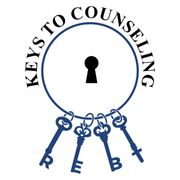Why REBT is the Most Effective Approach for Anxiety Counseling

At Keys to Counseling in Tampa, FL, I specialize in a specific type of therapy called Rational Emotive Behavior Therapy (REBT). Established by Dr. Albert Ellis in 1955, REBT is an active, directive, solution-focused, and goal-oriented approach to counseling and it is recognized as the pioneering form of Cognitive Behavioral Therapy (CBT).
Anxiety: “What if this happens?”
Rational Thoughts: “But it probably won’t.”
Anxiety: “But what if it does?”
Irrational Thoughts: “You’re right! This will likely happen and that would be awful!”
The notorious “what if” questions are often indicative of anxiety, which typically corresponds with awfulizing and catastrophizing beliefs. When we awfulize and catastrophize, we generally prevent ourselves from reaching our full potential and succeeding in our goals. In fact, our anxiety is NOT actually caused by events or adversities within our lives which may or may notoccur; rather, our anxiety is the result of our catastrophic thinking, as well as additional irrational beliefs that permeate our ability to think logically.
REBT (rational emotive behavior therapy) makes a distinction between healthy anxiety and unhealthy anxiety. In REBT, we think of anxiety as existing on a spectrum. On one end, we have healthy anxiety or concern. Therefore, when I speak about anxiety with my clients, I typically refer to healthy anxiety as concern, and unhealthy anxiety as anxiety, and I will follow these same guidelines in my writing. Concern helps us to proceed with caution when necessary, protects us against actual threats, and helps us to gain awareness of negative circumstances and events that we do not have the ability to change. At the other end of the spectrum is unhealthy anxiety or anxiety. Anxiety generally inhibits us from accomplishing our goals in a helpful, rational, and effective manner. Anxiety prevents us from enjoying daily activities, as it impedes our ability to efficiently function in our day-to-day routines, as well as be fully present within our relationships, and often results in poor performance, lack of creativity, and avoidant behaviors.
Through REBT-based counseling, I help my clients to learn how to distinguish healthy concern from unhealthy anxiety. Using REBT’s ABC Model of Emotion, I show my clients how to recognize and dispute their rigid irrational beliefs that are responsible for causing their unhealthy anxious emotions, and their unhelpful anxious behaviors, such as avoidance. As your counselor, I will help you to target any stubborn and maladaptive thought patterns linked to your anxiety, by transforming the way in which you think about anxiety through a variety of therapeutic exercises including cultivating rational coping self-statements, reframing your beliefs about anxiety, customizing coping strategies and problem-solving methods tailored to your preferences and learning style, implementing grounding and other MBCT (mindfulness-based cognitive therapy) techniques that aid in alleviating anxiety in the here-and-now, and establishing unconditional-self acceptance: all of which will help you to more effectively control your anxious thought patterns, as well as your physical reactions to anxiety.
As a person who has struggled with anxiety as well, I know first-hand how instrumental the combination of REBT and a compassionate solution-focused counselor can be in helping to more effectively address anxiety in the present, as well as learn to powerfully conquer its control over our emotional and behavioral well-being in the long-term. I understand how overwhelming anxious thoughts, feelings, and physical sensations can be; therefore, I always aspire to go the extra mile for my clients, sometimes by extending our session (at no additional cost) when time permits me to do so, and when I believe the extra time is therapeutically beneficial for my clients. Additionally, I often provide personalized “REBT Intermittent Reinforcement” emails to my clients in-between sessions (free of charge), as it helps to further reinforce specific and significant REBT ideas and strategies we have discussed during our work together in session. If you are struggling with anxiety at this very moment, here are some quick REBT-CBT tips to remind you that you will get through this and that your anxiety is not helping you to live mindfully, rationally, and peacefully in the present:
· No amount of anxiety will help you to predict the future or change the outcome.
· Excessive worry or obsessive thinking (i.e. anxiety) does not affect the probability that something bad will or will not happen.
· No matter what the future brings, you are stronger than you realize and better equipped to handle problems than you are giving yourself credit for.
· You have overcome adversity in the past and survived it; therefore, you can and will do it again.
· Just because something is unknown does not mean you could not handle it.
· One of the most effective ways to deal with anxiety is learning to become comfortable with the uncomfortable.
· It can be incredibly helpful to picture your worst-case scenario (this is whatever real or imagined circumstance that, when thinking about it, is responsible for causing the majority of your anxiety), and then envision yourself learning how to cope with it – if this exercise is too anxiety provoking for you to do on your own, we can strive to do this together in counseling!
Anxiety is by far the most common reason people decide to begin counseling, because even when other challenges are present, there is often some anxiety involved as well, including with couples, which is why REBT-based Couples Counseling is also highly effective for anxiety. Whether I am providing individual counseling or couples counseling, my clients and I form a collaborative team where we strive to understand, accept, and combat their anxiety together. If you or someone you know is struggling with anxiety, you do not have to suffer alone! Using REBT, I can help to quickly alleviate your emotional and behavioral distress related to anxiety, and ultimately support you in building and sustaining healthy and effective strategies to combat anxiety in the long hall!
At Keys to Counseling in Tampa, Florida, my mission is to promote healthy living through rational thinking! I provide both individual and couples counseling, and I would be honored to cognitively, emotively, and behaviorally accompany you on your journey to living, loving, being, and staying better!
Written by Jaclyn Hall, Founder of Keys to Counseling in Tampa, FL
If you are ready to take a positive and empowering step into your future, reach out to Jaclyn Hall at Keys to Counseling for a truly life-changing approach to individual and couples counseling. Call her office today at (813) 397-8099 for a free phone consultation!
About the Business
Have a question? Ask the experts!
Send your question

